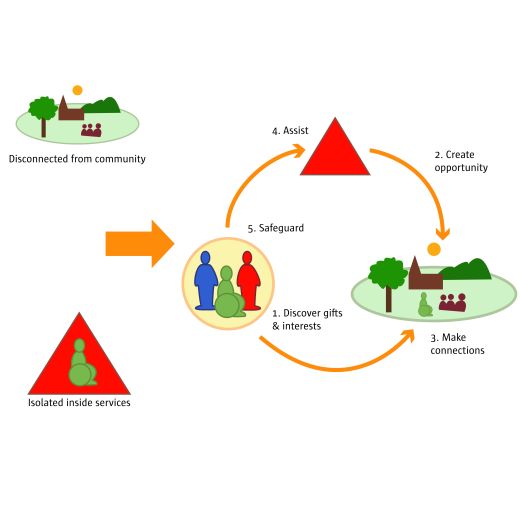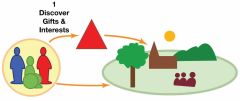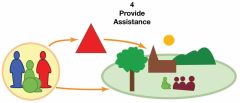Good support means helping people connect and be part of their community.
There are five basic tasks for anyone supporting people who are at risk of social exclusion: (1) discover gifts (2) develop opportunities (3) make connections (4) provide support and (5) safeguard.

The five basic tasks were developed by John O'Brien in 1986 as part of the Framework for Accomplishment Workshops. Despite their age they continue to describe capacities that service organizations need to learn to do better because so many people remain disconnected from valued social roles. The tasks are defined from the perspective of the service provider; but the point is to move service resources to the background, providing only the assistance necessary to support the foreground relationships between people at risk of exclusion and their communities.
Service providers who want to make a positive difference in the lives of the people they assist will commit themselves to continual improvement in their capacity to perform five basic tasks. These tasks are basic because each may be needed to assist a person to avoid slipping into social exclusion, to make the journey from the margins of disconnection from community or to move from a state of isolation inside a service setting shaped by a history of containment, control, protection and treatment.
Not every person will call on all of these capacities and fewer will require them as more people come to service providers as members of strong social networks and personal histories of participation in the life of communities that are consciously working to increase social inclusion.
These capacities are forms of assistance. They are done individually, with people and their allies - not to them. As such, they describe the way service providers assist in the work that people with disabilities and their allies do to contribute to their communities.
None of these tasks can be reduced to bureaucratic routine, because each depends on a relationship founded on respect for the dignity, capacity and responsibility of the particular citizen who chooses assistance in taking up a role as a contributor in their community. The test of an organization is the skill that those who provide direct and regular assistance display in enacting these capacities in their day to day relationships.

1. Discover interests and gifts - Meaningful engagement and contribution grows from what people care about and what they have to offer. Discovery can be as simple as stating what everyone who knows the person knows about them. But some people have experienced so little attention to their capacities and so few opportunities for exploration and development that they will benefit from a thoughtful and imaginative discovery process.

2. Develop community opportunities - Interests and gifts point the way to community settings that can benefit from the person’s participation. Creating opportunities may call for creative negotiation of a setting’s boundaries if those already involved there have difficulty imagining how the person can productively join them.

3. Make good connections - Exploring a community opportunity of interest provides intelligence about what gives the best chance for initial success. Some adjustments and accommodations may be necessary, and there may be preparations that the person and allies can undertake based on their knowledge of what works for the person.

4. Provide continuing assistance - Some people will require continuing individually tailored personal assistance to participate successfully. This assistance is artful when it leaves space for the person to engage freely with the people and routines in the setting and for naturally supportive practices to emerge.

5. Safeguard - No mater how meticulous the plan, breakdowns and problems will arise from time to time. Most people and their allies will appreciate service providers who are open to identifying problems, positive and flexible in trying other ways, and committed to learning with them what assistance supports them to have a good life.
For more information
John O’Brien and Beth Mount (2005). Make a difference: A guidebook for person-centered support. Toronto: Inclusion Press. www.inclusion.com or www.inclusiononline.co.uk
John O’Brien and Michael Callahan (2010) Employment Support as Knowledge Creation. In Research & Practice for Persons with Severe Disabilities, 35:1-2, 1–8.
Thanks to Simon Duffy for graphic elements.
The publisher is the Centre for Welfare Reform.
Five Basic Tasks © John O'Brien 2011.
All Rights Reserved. No part of this paper may be reproduced in any form without permission from the publisher except for the quotation of brief passages in reviews.
intellectual disabilities, social care, Inspiration